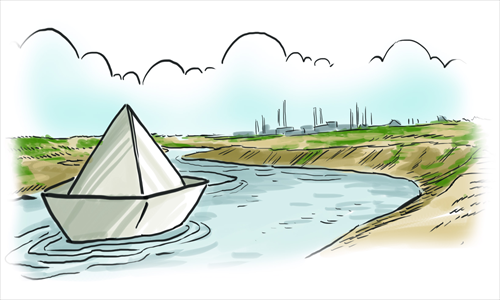HOME >> OP-ED, LAZY PACK
Occupy Central mirrors geopolitical shift
By Ding Gang Source:Global Times Published: 2014-10-15 23:08:10

Illustration: Liu Rui/GT
Shenzhen and Hong Kong are separated by a single narrow river. My first visit to Hong Kong was four years ago. Back then I took an 80 yuan ($13) shuttle bus from Shenzhen Airport and arrived in central Hong Kong two hours later, right at the place where the ongoing Occupy Central movement is underway.
I remember walking through the district, looking around street corners, and seeing in the stores many tourists from the Chinese mainland, just like me.
How many of us can still remember hearing of vast numbers of mainlanders risking their lives to flee to Hong Kong just a few decades ago?
The Beijing-based Global People magazine interviewed Chen Bing'an, author of The Great Exodus, in its early September edition. Chen estimated that a total of more than 1 million people fled to Hong Kong after 1949.
He also cited other statistics: In 1978 the annual per capital income of farmers in Shenzhen was only 134 yuan ($21.8), while farmers living in Hong Kong's New Territories could earn as high as HK$13,000 ($1675.7).
But that was exactly the year of transformation. The Third Plenary Session of the 11th CPC Central Committee was convened in December 1978.
Three decades later, UK scholar Martin Jacques wrote "And - with a little historical license - we should regard 1978 more properly as marking the beginning of the 21st century, the event that ushered in a new epoch, though barely anyone could possibly have realized it at the time" in an opinion piece published in the Guardian in May 2006. A radical change rarely seen during the past 500 years kicked off in 1978.
This is the historical background for the story of today's Hong Kong. Hong Kong is no longer a showcase, a banner, or a fortress, but rather has become a Chinese city at a similar level with Shanghai, Beijing, Guangzhou or Chongqing.
Before 1997, the strategic position of Hong Kong was decided by its identity as a British colony and by the Cold War architecture. The Cold War also turned the city into a fortress. This position started to change with China's reform and opening-up policy.
However, it should be noted that Cold War geopolitics wrought differences not only in systems, but also in people's mentality, understanding of history and views of democracy.
The Occupy Central movement reflects Hongkongers' identity crisis and mental maladjustment, both brought about by geopolitical changes. That can also explain why Hong Kong has long been mired in the center of geopolitical controversy.
Nowadays, Chinese investors are looking around Asia and around the world for their next opportunity. Chinese tourists can also be found everywhere. They bring not merely money, but also their perspectives of the current global political and economic orders. Their outlook of global order derived from an oriental culture distinct from Western traditions.
When news of Occupy Central first broke, one of my colleagues was interviewing a businessman from Central China's Hunan Province on a 3,800-meter-high plateau in Bolivia.
She told me that the Chinese firm had given the poverty-stricken village in the Andes Mountains an unprecedented opportunity for development. Now villagers there have smart phones.
Sharing China's development dividend has become a pervasive phenomenon in Asia. The 2008 global financial crisis shook the foundation of global public trust in the US and Europe. Meanwhile, Asia has seen accelerated geopolitical changes, and China's image has become increasingly positive. This partly explains why some in the US and the UK are so excited about the Occupy Central movement in Hong Kong.
In the past, the rise of great powers determined the direction of geopolitical order. Occupy Central reminds us that the formation of a new geopolitical order requires not just the rebalancing of regional power structures, but also the restructuring of intellectual identities. The later may takes longer time.
Nevertheless, a re-configuration of the Asian order is now inevitable, although economic integration within the region has yet to be reflected at the level of political coordination.
The influence of the old order will fade away on the historical stage, a trend that Hong Kong can in no way change.
The author is a senior editor with People's Daily. He is now stationed in Brazil. dinggang@globaltimes.com.cn. Follow him on Twitter at @dinggangchina
Posted in: Columnists, Viewpoint, Commentary